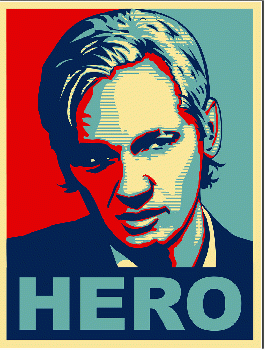See original here
By Catherine Vogan in Sydney, Australia
While most of the talk about the Julian Assange case is about the espionage charges, which are political in nature, the U.S. case hangs by a thread for the second time on the non-political charge: conspiracy to commit computer intrusion.
There is a reason why the computer charge is so vital to the U.S. case. Charging a journalist with espionage for unauthorized possession and dissemination of defense information has been possible since 1917, but it runs the risk of violating the First Amendment.
The tradition has been instead to charge leakers and hackers for breach of an oath, contract or firewall. The legal and public perception of hacking is that it is much like burglary; something generally feared and whose punishment by the state is not subject to political debate or opposing laws; but rather welcomed. The intrusion charge shifts public and legal perception.
Since the U.S. is on shaky constitutional ground with the espionage indictment, the computer intrusion charge has served as a hook to try to get Assange, by portraying him not as a journalist, but as a hacker. Underscoring the difference between the two is fundamental to the U.S. case.
That's why the U.S. prosecutor, James Lewis QC, on the opening day of Assange's extradition hearing in February 2020 turned to the press in the courtroom and told them journalism was not the target of the U.S. prosecution. He said Assange was not a journalist and instead had participated in the theft of government documents. In other words: he's not a journalist like you, but a hacker.
This distinction was spelled out by none other than the current president of the United States when he was vice president in December 2010. He told television interviewer David Gregory:
"If he conspired to get these classified documents, with a member of the U.S. military, that's fundamentally different than if someone drops on your lap [reaches out to news anchor and slaps table], Here David, you're a press person. Here is classified material."
Declined to Indict
Unable to come up with that proof, the Obama-Biden administration declined to indict Assange in 2011. The New York Times had published many of the same WikiLeaks documents that Assange had, so logically, the Times would be just as guilty of violating the Espionage Act.
Indicting Assange and the Times would be a clear conflict with the First Amendment. But if it could be proven he was a hacker, and not just a journalist, that would have opened the way to indicting Assange, Joe Biden said.
Faced with this same dilemma, the U.S. bolstered its Espionage Act indictment of Assange with seperate charges for conspiracy to commit computer intrusion. The indictment was marked SEALED but then "Filed in Open Court" on March, 8, 2018, almost a full year before Assange was arrested, April 11, 2019. On that day the computer intrustion indictment was unveiled to the public.
(Note: You can view every article as one long page if you sign up as an Advocate Member, or higher).





